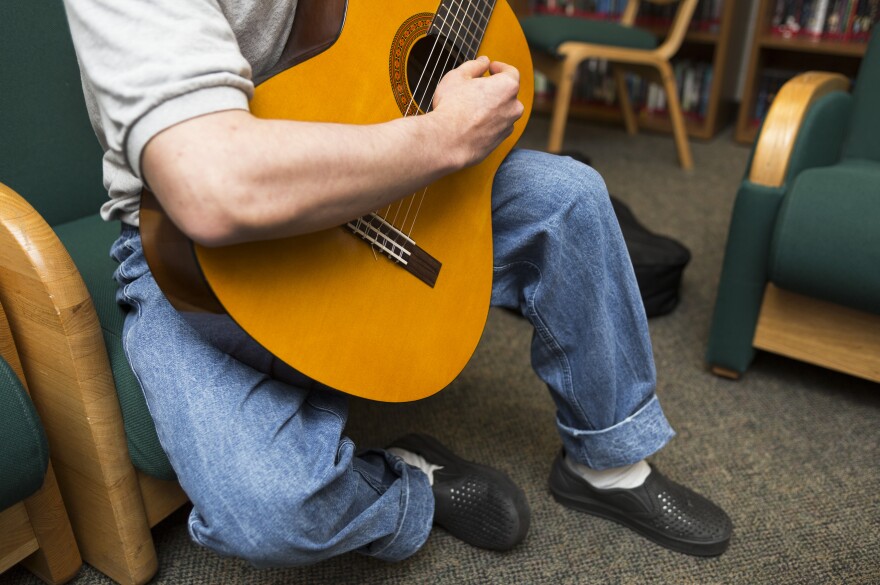Demetrius Hardison and Israel Uballe are warming up for their guitar lesson.
This summer, Hardison and Uballe are the only two students taking guitar here. But during the school year, there are two sections of guitar lessons with four to six students each. Students can earn academic credit for taking the lessons, which take place twice a week during the school year.
Jeremy Osborn, a teacher from the Austin Classical Guitar Society, leads the boys through their warm-ups.
“[The students] come into the class, and they don’t realize that they’re going to excel at the guitar," Osborn says. "These kids haven’t had a chance to really excel at something.”
And these kids aren't typical classical guitar students: Both Hardison and Uballe are residents at Gardner Betts Juvenile Center, a juvenile detention facility in Austin. Residents at Gardner Betts have typically been involved in the justice system before and their stay at the facility can last anywhere from a few months to two years.
The guitar program was created in 2010 by Matthew Hinsley and Travis Marcum, the Executive Director and Director of Education at Austin Classical Guitar. Hinsley says that at the time, the society already had thriving education programs in many Austin public schools. That’s when they heard from Forrest Novy, a former professor at UT’s School of Social Work.
“He heard about our program, and he thought that the work that we were doing, the benefit that we were bringing to middle schools and high schools, could perhaps be a great benefit to the kids at Gardner Betts,” says Hinsley.
Osborn took over the teaching position from Marcum in January. He encourages students to give small performances at Gardner Betts graduations, family potlucks, and for center staff. The students also perform at the swearing-in ceremonies for CASA, the Court Appointed Special Advocates program. As many as 150 people attend these events. Here's Kasaya, which was performed at one such ceremony.

Hardison remembers one of his first concerts: “I never performed with a guitar. I never had no kind of concert like that before. Felt special. First time ever doing it, first time ever playing guitar, first time having the audience applauding. Standing ovations. It felt awesome.”
He says that playing guitar has become important to him. “It’s awesome playing it, you know, because it’s good and satisfying to yourself. I feel wonderful when I play guitar and write music.”
Right now, Hardison is working on a solo.
Osborn says after the first performance last semester, he was overjoyed.
“Each of the students just gave me a hug one by one and said thank you. I was not expecting that."
Osborn's students weren’t expecting that either. Uballe says he knew it would be fun to learn guitar, but he never thought he’d become close with his teacher. “I wasn’t really expecting my teacher to become, like, a friend, I guess you could say," said Uballe. "It’s kind of cool, you know. I go in, just think that I’m going to learn this and come out. [But] I go in and learn this and meet a lot of cool people and got to perform with cool people along the way.”
Matthew Hinsley – with the Austin Classical Guitar Society – hopes this class model can be used in other institutions. He has already helped set up public school guitar programs across the country. “I definitely see our work in the Travis County Juvenile Justice system soon becoming a benchmark model for other systems.”
Both Uballe and Hardison plan to keep playing guitar after their time at Gardner Betts. Austin Classical Guitar will provide each of them with a free guitar and private lessons, if they ask.
Uballe hopes to also learn piano and take classes in audio production. “It’s real soothing. Like, when I was out before I came here, I had a real big anger issue. Learning the guitar helps a lot because I can just focus on the strings and focus on how it sounds.”
For now, Uballe and Hardison will keep practicing their solos and preparing for their upcoming performances.








